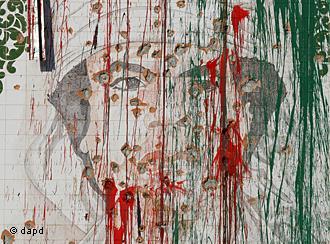-
TOP STORIES
-
MEDIA CENTER
- PROGRAM
-
LEARN GERMAN
German Courses
Community D
Teaching German
The Arab Spring promised democratic change across the Middle East and North Africa. While a number of oppressive regimes have fallen, the hoped-for paradigm shift has not fully materialized.

Even after the fall of regimes, democracy is some way away
Twelve months ago Gamal Mubarak, Saif Al Islam al Gadhafi and Ahmed Saleh all had very good career prospects. As children of Arab dictators, they were highly qualified and in a perfect position to rise to the office of head of state. Their fathers - Egyptian President Hosni Mubarak, Libya's revolutionary leader Moammar al Gadhafi and Ali Abdullah Saleh, Yemen's head of state - had all planned to pass their power and political office to their heirs.
Each son had been groomed for succession. This seemed to be the easiest method to protect the influence and the wealth of these ruling families which had spent decades fostering these interests.
Failure of the republican dictatorships
However, each dictator had made a series of miscalculations. Since beginning of the Arab Spring, these three - plus Tunisia's Zine El Abidine Ben Ali - have been hunted out of office by an angry populace, their sons' career aspirations destroyed along with their fathers' regimes.
A common belief still hangs in the air: the model of the republican dictatorships which has dominated the Arab world since the 1950s and 1960s has failed.
 Dictators like Gadhafi saw their dynasties meet a bloody end
Dictators like Gadhafi saw their dynasties meet a bloody end
As far as the populations behind the Arab Spring are concerned, the fall of those regimes in counties which attempted to set up a hereditary dynasty has proven this. Meanwhile, the one son who succeeded his father - Bashar al-Assad, the heir to former Syrian president Hafiz Al-Assad - fights to retain the power that was handed down to him. But his days as a president also appear to be numbered.
"Were the Assad regime to fall it would mark the definitive ending of the attempt to create 'republican dynasties' in the region," Dr. Kristian Ulrichsen, a Middle East and North Africa expert at the London School of Economics, told Deutsche Welle.
"The downfalls of Gadhafi, Ben Ali and Mubarak have powerfully demonstrated the levels of popular disgust at the attempts to keep power firmly within the families of non-monarchical rulers," he added. "Already, the myth of these forms of dynastical succession has been shattered, and it is only a matter of time before the Assad regime falls victim too."
The fall of the dictators appeared to create a possibility for real choices. Those Arabs which demonstrated for days, weeks and in some cases even months against the regimes that ruled them all shared the central demand of co-determination. The fall of the dictators promised them a say in the running of the nation which had long been denied them.
However, in a relatively short time, the climate of hope surrounding the moves to the first free elections in many countries has vanished in some.
In Tunisia, the Islamic Ennahda party has emerged as the strongest while in Egypt, an electoral victory for the Muslim Brotherhood is increasingly likely. Radical Salafists also look to take a short cut to power, despite faring less well in elections so far. With this potential move toward fundamentalism across the Arab Spring nations, the voices of the democrats, the bloggers, the women, the moderate Islamists and the founders of the revolutions seem to fade away.
Disappointment of the democrats
"It is not the democrats who have profited from the fall of regimes in the Arab world," Guido Steinberg, Middle East expert of the German Institute for International and Security Affairs, told Deutsche Welle. "Above all, it is the well-organized and increasingly well-financed Islamic movements which have mostly arisen from the Muslim Brotherhood."
As well as Tunisia and Egypt, Yemen and Libya have also seen the Islamists emerging as the strongest and profiting most from the breakdown of the old order.
 Protestors fear "fraudulent elections, new dictatorship."
Protestors fear "fraudulent elections, new dictatorship."
Many advocates of democracy are disappointed by this development. The construction of real democracies, if any have really begun, moves extremely slowly. There are still very few signs of any emerging pluralistic societies and the serious economic and social problems which prompted some of the uprisings still remain unsolved. Tunisia's economy is still in deep trouble while the Egyptians also continue to struggle with huge economic problems.
Since beginning of the Arab Spring, foreign investments have evaporated and the tourism industry has crumbled. At the same time, unemployment has increased and budget deficits in many countries have reached a dangerous level. In Yemen and Libya the whole economy has collapsed due to the reduction in oil production.
The social crisis, high youth unemployment and desperate economic climate have forced many young people to leave their homelands. It is a situation ripe for the Muslim Brotherhood which was forbidden as a political force in many countries but was tolerated because of its good organizational structure and its social and community work. Many people look for such qualities in their leadership.
Despite these developments, Norbert Lammert, president of the German Bundestag, has warned against too much pessimism. "We must not make the mistake of overlooking the chances that have arisen in these countries regardless of how difficult the discussions are and how substantial the problems are," he said. "Hopefully after the free elections in Egypt we can get to a level of parliamentary relations. This will change things - and also provide a new perspective on the question of economic relations."
However that change, warns Kristian Ulrichsen, will not happen overnight. "Building a democratic culture inherently takes many years to achieve, and cannot be imposed or achieved in a single year," he said. "There will be ups and downs along the way, but the model of authoritarian leadership has been shattered, and governments will never again be able to claim any form of legitimacy from the practice. That is transformative."